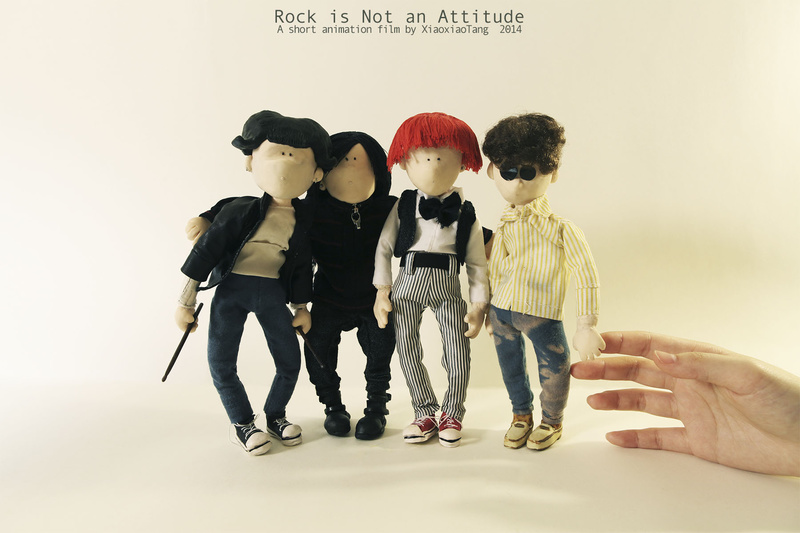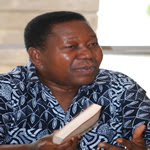ROFFEKE: What inspired you to write "Brother"?
Chambers: When my Mother passed away in 2012, I came back from Oklahoma after her funeral, and I was at that place where I needed a direction. My Mother was very influential to me in a creative sense, and I had this Pentel mechanical pencil since 1985 that she had given me. I wrote countless works with that pencil, and it even had rust on the clip! I placed that in the coffin with her at her funeral. I bought a new pencil the next day, and the first thing I wrote was the handwritten script for "Brother".
ROFFEKE: Was “Brother” autobiographical?
Chambers: All of my films are autobiographical in some way, and “Brother” has elements of me and my mother. It also has a special place for the lead actor, as he had also lost a dear friend around the same time. We both worked through our own interpretations of this as we progressed through production. This was one inspiration. The other was watching Clint perform one night, realizing how kind and happy he is. I challenged him to be the opposite and he ran with it.
ROFFEKE: Why black and white?
Chambers: Two reasons: it's cheaper, but it also lends itself to a mood, a contrast and a visual expression like none other. I simply love working in black and white.
ROFFEKE: High point and low point during filming of "Brother"?
Chambers: The low point was getting a film transfer done locally and the whites were all washed out. I was shooting with extreme tension in each scene, and I pushed the boundaries of light. The local studio tried their best, but I had to look elsewhere. Eventually, all was well. I was not creating dailies, but I would have developed and transferred film ready by the next shoot, most times. The highlight, aside from watching all these great people, new friends and old friends (one of which passed away this last January) come together and have fun, it was seeing the screening filled to capacity and beyond and enjoyed by all.
ROFFEKE: Which directors/films inspire you?
Chambers: Oh...well, a great many. Kurosawa, Kubrick, Maya Deren, Lucas, Ridley Scott, Herzog...mainly the old guard. Godard, especially. Very few new directors. I like Abrams and his dedication to celluloid. In that same vein, I also like Nolan and Tarantino. Joss Whedon is another. People who are dedicated to the story. My earliest and what is still a big influence on me was science fiction film and television, and I love B-Movies. Roger Corman comes to mind, and John Carpenter, a real indie pioneer, though often forgotten. I love Ed Wood films. There's also Steve DeJarnett, and countless others. Cameron Crowe....really good storyteller. I like people who also have an eye for the visual (Kubrick, Trumbull, Spielberg, Dario Argento). I think Star Wars was the one film that made me want to do the same.
ROFFEKE: Advice for aspiring writer/director?
Chambers: I don't think many of the indie film scenes and a growing number of festivals are there for the filmmaker, and I am certain that people care less and less about "cinema" or "art". It's becoming a popularity contest without honesty, story or integrity, just like the music scene, and people are more focused on what gear is being used. That being said, my advice is, don't give anyone your money, or tell you what to do. Film schools are worthless. Go read, and then do. And do some more. Don't discount the discipline of shooting film, even if the digital world is prejudiced against it. Choose your cast and crew carefully, and I would even say stay away from most "scenes" or groups. I feel Seattle is horribly lacking in film, though they don't think so. And, again, listen to your voice, your heart and your vision. Everyone has opinions. The problem is that everyone wants to tell you about them. A good example is, it IS okay to shoot a film with your friends. Many successes are based on this.
ROFFEKE: In your opinion, does luck play any role in the making of a film?
Chambers: Chance is an opportunity if we have the mind to see it. I don't really take a side on this. We choose what to do, but there are serendipitous moments and we have to be ready. Otherwise, we have to be patient. That is something that many in this tech age do not understand. Everything has to be instantaneous, and so you will miss out on a great deal. I think we, the auteurs and the thinkers and the dreamers are the luck for any kind of creative endeavor.
ROFFEKE: Film by female director that you would recommend?
Chambers: Anything by Maya Deren. I like Sofia Coppola, but not all her films. One director that does stand out is Kathryn Bigelow. I haven't seen all her work, but when I watched her documentary on the making of "K19", she resonated with me when she made the decision to make the film despite what the producers thought, because she felt she needed to make an honest representation of the man and his story, and that this piece of history needed to be told. That is filmmaking. There is a woman in California named Anna Biller. She makes stylized Technicolor-esque films that are brilliant and unique. We need more of that.
ROFFEKE: Why did you choose to submit your film to ROFFEKE?
Chambers: I am growing numb and discontented with the way film is treated all over the world. As a former film festival found, director and programmer, I found it more and more difficult to find good films. Still do. The film may have all the gear and look and sound great, but if there is no story, then what's the point? I like diversity and the "off the beaten path" kind of endeavor, where somebody chooses to do something unique as opposed to the same thing over and over. That is why I chose ROFFEKE.
ROFFEKE: Tell us about your experiences as a film festival founder, director and programmer.
Chambers: I founded the Blue November MicroFilmFest in 2003. It began in Tulsa, OK, after I made my first film for eleven dollars and spent over a hundred dollars in festival submissions, none of which accepted me. I thought this type of math didn't add up. And being a starving artist, I thought, "people should be able to enter their films for free, and people should be able to experience great cinema for free." So I began a festival, out of my own pocket, that neither required an entry fee nor did it require admission. It was an international film festival with local musicians and artists. It was hard work, and maybe I missed the mark here and there, but I tried my best to support local, support film, and support art in general.
ROFFEKE: Best and worst part about being a film festival director/programmer?
Chambers: The best part is seeing what you can do, and seeing some of the most beautiful visual images you will ever see. The worst part, and what caused me to end the festival after a ten year run, was that people (sadly) began to ruin what made it fun. Those filmmakers that I could find locally were overly demanding and dramatic. The Seattle press and community did not support what I was doing, and the films became less and less astounding. It was like I was watching everything that made cinema great, for me and in general, I was watching it die. So, after ten years, I turned off the projector, and put my screen to bed.
ROFFEKE: Lessons you learned?
Chambers: If I have any lesson to take away from the experience, it is this: people will let you down. I had some great people that worked closely with me, and they are one of the reasons I miss the festival. Find those people and keep them close, cherish them, for everyone else lacks what community really means. Films, even indies these days, are becoming boring and tiresome businesses. There is very little to do with the art. And so films are suffering. Art is suffering. It is a lonely field when you stand alone, but sometimes that is the way of things. But then, every so often, someone stumbles into that same field for the same reasons. Hold on to those people, those festivals and those types of communities.
You can read more about "Brother" here .
Subscribe to:
Post Comments (Atom)




























































































































































































No comments:
Post a Comment